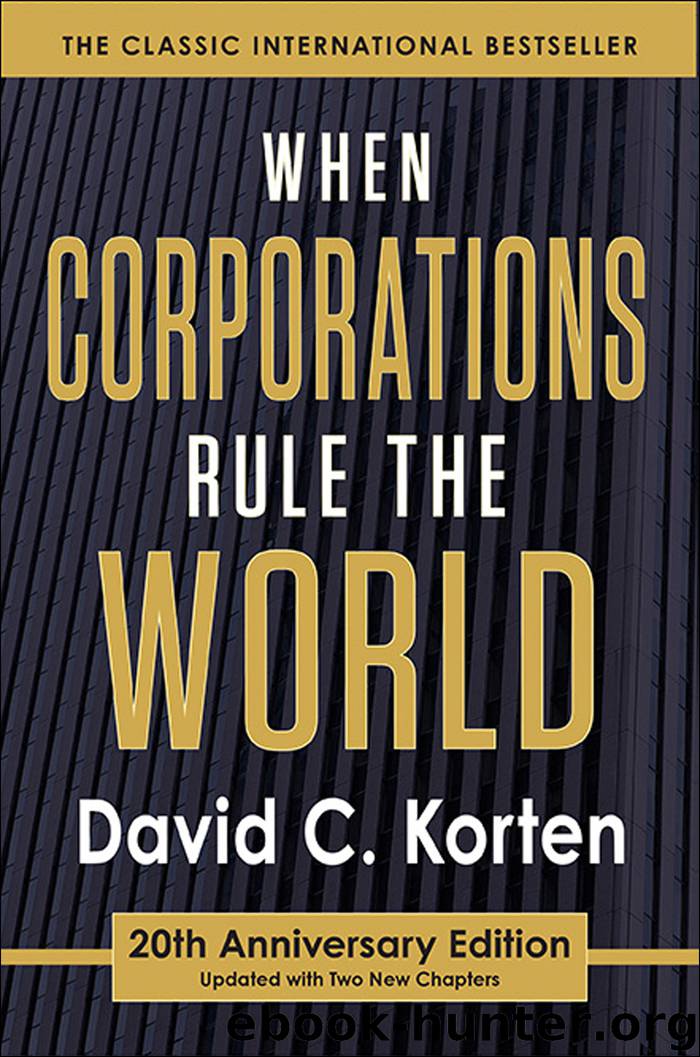When Corporations Rule the World by David C. Korten

Author:David C. Korten
Language: eng
Format: epub
Publisher: Berrett-Koehler publications
Published: 2015-09-19T04:00:00+00:00
CHAPTER 15
Predatory Finance
You can’t make any money like this. The dollar is moving sideways, the movement is too narrow. . . . Anyone speculating or trading in the dollar or any other currency can’t make money or lose money. You can’t do anything. It’s been a horror.
—CARMINE ROTONDO, foreign exchange trader at Security Pacific Bank
One of the ideological premises of corporate libertarianism is that investment is by nature productive in the sense that it increases the size of the economic pie, adds to the net well-being of society, and therefore is of potential benefit to everyone. In a healthy economy, most investment is productive. The global economy is not, however, a healthy economy. In all too many instances, it rewards extractive investors who do not create wealth but simply extract and concentrate existing wealth. The extractive investor’s gain is at the expense of other individuals or the society at large.
In the worst case, an extractive investment actually decreases the overall wealth of the society, even though it may yield a handsome return to an individual. This occurs when an investor acquires control of a productive asset or resource—such as land, timber, or even a corporation—from a group that is maintaining the asset’s productive potential, then liquidates it for immediate profit. The investor is extracting value, not creating it. In some instances, such as an ancient forest, the asset may be irreplaceable. An investment that simply creates money or buying power, such as through the inflation of land or stock values, without creating anything of corresponding value, is also a form of extractive investment. The investor creates nothing, yet his or her share of a society’s buying power is increased.
Speculation is another form of extractive investment. The financial speculator is engaged in little more than a sophisticated form of gambling—betting on the rise and fall of selected prices. When a speculator wins, he or she is simply capturing claims to wealth created by others. When a large speculator funded with borrowed money loses, the survival of major financial institutions may be placed at risk, resulting in demands for a public bailout to save the financial system from collapse. In either instance, the public loses. Rarely does a speculator’s activity contribute to the wealth or well-being of society.
Although there may be some merit to speculators’ claims that their activities increase market stability and liquidity, these claims have a hollow ring in increasingly volatile, globalized financial markets in which speculative financial movements are a major source of instability and economic disruption. Whatever contribution speculators may make to increasing financial market liquidity, it comes at a substantial cost in terms of the profits and fees they extract. Costs of the additional risks and economic distortions created by a sophisticated class of financial instruments known as derivatives far exceed any possible benefit to society.
The derivatives contracts that are currently a hot topic in the financial press involve bets on movements of stock prices, currency prices, interest rates, and even entire stock market indices. Futures contracts on interest rates didn’t exist until the late 1970s.
Download
This site does not store any files on its server. We only index and link to content provided by other sites. Please contact the content providers to delete copyright contents if any and email us, we'll remove relevant links or contents immediately.
The Meaning of the Library by unknow(2561)
Six Billion Shoppers by Porter Erisman(2292)
Why Nations Fail: The Origins of Power, Prosperity, and Poverty by Daron Acemoglu & James Robinson(2280)
No Time to Say Goodbye(2108)
Red Notice by Bill Browder(2068)
Currency Trading For Dummies by Brian Dolan(1919)
The Economist [T6, 22 Thg9 2017] by The Economist(1914)
Thank You for Being Late by Thomas L. Friedman(1762)
Bitcoin: The Ultimate Guide to the World of Bitcoin, Bitcoin Mining, Bitcoin Investing, Blockchain Technology, Cryptocurrency (2nd Edition) by Ikuya Takashima(1688)
Amazon FBA: Amazon FBA Blackbook: Everything You Need To Know to Start Your Amazon Business Empire (Amazon Empire, FBA Mastery) by John Fisher(1559)
Coffee: From Bean to Barista by Robert W. Thurston(1521)
The Future Is Asian by Parag Khanna(1477)
The Great Economists by Linda Yueh(1447)
How Money Got Free: Bitcoin and the Fight for the Future of Finance by Brian Patrick Eha(1417)
Grave New World by Stephen D. King(1414)
Pocket World in Figures 2018 by The Economist(1406)
Capitalism Without Capital: The Rise of the Intangible Economy by Jonathan Haskel(1389)
The Sex Business by Economist(1374)
Cultural Intelligence by David C. Thomas(1286)
